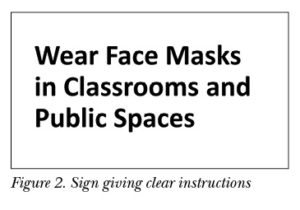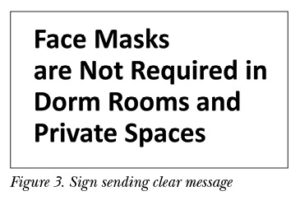By Russell Willerton | STC Member
The COVID-19 virus has killed millions around the world, sickened more than one hundred million, and changed the courses of lives, businesses, and nonprofits. As experts and authorities have tried to respond appropriately, their public messages have at times confused people. I believe authorities have an ethical responsibility to convey COVID-19 information clearly, and I argue that plain language can be part of an ethical communication strategy.
Ethics Viewpoints
There are many views on ethics, and I will only scratch the surface here with some mention of some major ideas.
Immanuel Kant is well known for his categorical imperative. His views are often called deontological; his is a top-down approach to ethics based on applying broad principles.
- The first formulation of his categorical imperative is “Act as though the maxim of your action were by your will to be a law of nature.” That is, always embody reasoned positions about ethical action.
- The second formulation is “Act so that you always treat humanity, whether your own or someone else’s, always as an end and never as means to an end.” This is sort of akin to the Golden Rule, which is “Do unto others as you would have them do unto you” (although Kant tried to avoid letting self-interest affect decision making).
Another view of ethics is utility, which focuses on the positive effects of an action. Utilitarianism promotes the greatest good for the greatest number. John Stuart Mill and Jeremy Bentham wrote much about utility. Technical communication scholar Mike Markel calls utilitarianism the ethics behind cost-benefit analyses. But if ethics is measured only in terms of financial cost, other ethical principles may be left out of consideration.
Virtue ethics is an approach promoted by Aristotle in his treatise The Nicomachean Ethics. Good actions reflect virtues of the good life; the good is intrinsically good and right. Aristotle’s virtues include courage, temperance, generosity, truthfulness, and friendliness.
Feminist approaches to ethics have become more prevalent in recent decades. Feminist approaches take into account the specific aspects of each situation. In some cases, they provide a counterpart to deontological approaches that are more concerned with universal applicability. The ethic of care is a feminist approach that involves responding to specific situations and taking relationships and imbalances of power into account.
Martin Buber wrote about dialogic ethics in the early 20th century. Dialogic ethics provides a way to understand human relationships as dialogue. His book, I and Thou, focuses on paired relationships. Do you regard the other as “Thou” or “You?” Or do you regard the other as “it?” In hierarchical relationships, there’s the potential for the one with more power to regard the other as it. But Buber argues that when two parties view each other as You instead of it, they treat each other more humanely.
Literature Review Learnings
Through the course of doing the literature review for my book (Willerton, 2015), I learned several things. First, the review showed that professionals consider it ethical to communicate to audiences clearly and unethical to confuse or mislead them. Second, it showed how effective communication, which plain-language communicators strive to provide, meets the ethical standard of utility or the pursuit of the greatest benefit; however, utility pursued to the extreme can lead to unethical behavior. Third, the review showed that the Kantian perspective on individuals’ rights and on imperatives to respect those rights complements goals of plain-language communication.
Fourth, feminist perspectives on ethics and communication recognize and address imbalances of power; plain-language communicators routinely write for audiences who lack power and agency in the situations they face. Fifth, the review showed how Buber’s dialogic ethics provides a means of understanding and theorizing plain-language communication. Buber’s dialogic ethics helps us see that we are not merely writing to an audience, but ideally writing with the audience.
Ethics and Plain Language
As I was thinking about ethics and plain language, I tried to focus on the things that go well in plain language. I tried to focus on the strengths. I then thought about the kinds of situations in which plain language solves problems, the kinds of situations where people benefit from plain language. I developed an acronym for what I call BUROC situations. I used the perspectives of plain language professionals to help refine what BUROC means (Willerton, 2015).
B is for bureaucratic. These situations involve some kind of bureaucracy—layers of policies, procedures, and approvals that affect individuals’ access to what they need or want.
U is for unfamiliar. People encounter these situations rarely or infrequently. These situations require people to use jargon, policies, and even facilities that are not immediately at their command or recollection.
R-O is for rights-oriented. These situations are especially important, because they affect individuals’ choices to act within their rights—rights as citizens, as patients, as consumers, as humans.
C is for critical. These situations are weighty; they are important. People should not regard them lightly. They can have significant consequences for people facing them. These situations often arise without warning, and they might require urgent decisions or actions.
COVID-19 is a BUROC Situation
Bureaucracies frequently struggle to communicate effectively with their constituents. Within the bureaucracy, workers often lack agency to impact messages sent down from the top. The sign shown in Figure 1 repeats a policy statement rather than sending a clear message. The policy states “…institutions will require all faculty, staff, students, and visitors to wear an appropriate face covering while inside campus facilities/buildings where six feet social distancing may not always be possible. Face coverings are not required in one’s own dorm room or suite, when alone in an enclosed office or study room, or in campus outdoor settings where social distancing requirements are met.”

So, what should a person do in a classroom with seating that promotes social distancing? Does social distancing replace the need for a mask? At least at this institution, the administration decided that no, social distancing in the classroom does not replace the need for a mask. Unfortunately, in a few instances, some instructors taught without masks, because the instructions were not clear.
Signs in plain language help people protect themselves by giving clear instructions.
The sample sign in Figure 2 gives clear instructions.

The sample sign in Figure 3 sends a clear message.

Proponents of plain language frequently focus on the utilitarian benefits of plain language; plain language frequently saves readers time and saves companies money. In a situation like a pandemic, when people have many things to worry about and need to do certain things to protect themselves and their families, plain language can be a means of treating the audience with respect and care. In BUROC situations, plain language supports ethical action.
Columnist’s note: This column is adapted from a presentation given by the author for the Access For All conference, hosted in October 2020 by Clarity International, the Center for Plain Language, and Plain Language Association International.
References
Kant, Immanuel. 1969. Foundations of the metaphysics of morals. In Kant: Foundations of the metaphysics of morals: Text and critical essays, edited by Robert P. Wolff, translated by L. W. Beck. Indianapolis, IN: Bobbs-Merrill.
Markel, Mike. 2001. Ethics in technical communication: A critique and synthesis. Westport, CT: Ablex Publishing.
Willerton, Russell. 2015. Plain Language and Ethical Action: A Dialogic Approach to Technical Content in the 21st Century. New York: Routledge.
This column features ethics scenarios and issues that may affect technical communicators in the many aspects of their jobs. If you have a possible solution to a scenario, your own case, or feedback in general, please contact column editor Russell Willerton at russell.willerton@gmail.com.


